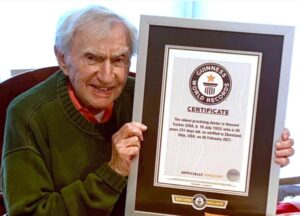Ask Dr. Howard Tucker about people who want to retire early and he’s incredulous. At 100, the neurologist has been working in medicine for 75 years.
Guinness World Records has named him the world’s oldest practicing doctor. Tucker just recently stopped seeing patients, but he’s still teaching medical residents at St. Vincent Charity Medical Center in Cleveland, Ohio, heading to work twice a week.
“I look upon retirement as the enemy of longevity,” Tucker told TODAY during a recent video call. He has a computer and smartphone, and is determined to keep up with technology.
“I think that to retire, one can face potential shriveling up and ending in a nursing home. It’s fun staying alive and working… It’s delightful work. Every day I learn something new.”
Tucker was born on July 10, 1922, in Cleveland. As his family gathered to celebrate his 100th birthday last month, he received the “gift of COVID” from one of his relatives who was a hugger and a kisser, he said, but recovered quickly and felt fine.
Besides surviving the pandemic, he’s also lived through the Great Depression, World War II and a century worth of historical crises. Tucker hasn’t had to deal with major diseases, but he broke his neck skiing in his late 80s and “came out of it totally intact,” he reassured his interviewer.
He’s worked at the Cleveland Clinic and passed the Ohio Bar Exam at age 67 because he was interested in law — a remarkable life that will be the subject of the documentary “What’s Next?” The filmmakers are raising funds for post-production.
Tucker shared some of his longevity advice with TODAY:
How to live a long and healthy life:
“Heredity and family history of longevity is a healthy start. However, it must be supported by moderation of nutrition, alcohol, and happiness,” Tucker explained in his Guinness World Records entry.
The good genes are clearly in place: His mother lived to 84 and his father to 96. Tucker has managed to avoid heart disease, cancer, dementia and other major health problems many people must deal with as they age: “I recognize how I’ve been blessed with that,” he said.
Tucker never smoked. He drinks alcohol socially and sometimes has a martini on Friday night. When it comes to food, he enjoys everything in moderation.
The centenarian has exercised all of his life, regularly swimming, jogging and skiing, he said. His family prohibits him from skiing after that accident in his late 80s, so he’s taken up snowshoeing. Tucker also now works out in his home gym, which includes a treadmill, stationary bike and “an old-fashioned NordicTrack, which is like skiing.”
Don’t retire:
Tucker recognized there are jobs people physically can’t do anymore as they age or don’t want to stay in because of the pressures and emotional toll. But with all that aside, retirement is a poor choice — at least for him.
“I don’t understand it. I don’t understand golfing three days a week,” Tucker said.
“I’m going to caution (people): If they retire from their work, they should at least do something as a hobby, whether it be communal work or self-hobbies… you need a stimulus for the brain daily.”
Keep learning:
Tucker, who received his medical degree from The Ohio State University College of Medicine in 1947, became a physician years before MRI and CT scans became available. He saw doctors retire because they didn’t want to learn how to use computers. He himself found new technology challenging, but was determined to keep up with it.
“The whole world is full of computers and they live by computers. If I want to stay in this world, I’m going to do it,” he said.
Tucker credited his grandson Austin for helping him navigate new gadgets and apps.
The neurologist keeps up with his field by studying and reading, which he thoroughly enjoys and continues to get excited by, he added.
Tucker is also a lawyer, though he doesn’t practice. He went to law school at night in his 60s while seeing patients during the day because he was interested in the law.
Cultivate happiness:
“You have to be happy in your job and in your domestic life,” Tucker said.
He still recalls a patient who was so frightened by her work and oppressive boss that she would drive around the block several times before she made herself go inside in the morning. The woman had a major stroke at age 42, which Tucker felt was caused in large part by her work stress.
When it comes to his personal happiness, he and his wife, Sara — who is a practicing psychiatrist and still sees patients — have been married 65 years. “She’s only 89,” he noted. They have four children and ten grandchildren.
The doctor is very much as optimist. “I think I’ll live forever, knowing that it’s not real. But I feel that way. I never think of death,” he said. “You die once, but you live daily… focus on the living.”

